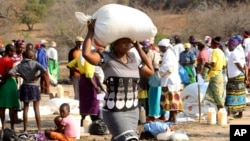Zimbabwe is regressing back into economic and social turmoil that ravaged the country before the installation of the coalition government in 2009, analysts said Tuesday, as they differed with a new survey saying Harare has made strides in addressing governance issues.
The disappearance of activist Itai Dzamara, the analysts added, has also put a dent on positive achievements by the unity government that was disbanded in 2013.
The analysts were reacting to the Ibrahim Index of African Governance (IIAG) released on Monday showing Zimbabwe as one of the six countries that have taken action on governance issues for the period between 2011 and 2014.
The survey is arguably the most comprehensive of its kind on the continent – rating Africa’s 54 nations against criteria such as security, human rights, economic stability, just laws, free elections, corruption, infrastructure, poverty, health and education.
The survey says progress in governance across Africa has stalled since 2011, with deteriorating safety and lack of economic opportunity overshadowing any gains made on the human rights front especially in resource-rich nations.
However, the survey also rated Zimbabwe as one of the six countries that have made moved to address governance concerns.
Analysts observe that the period just after the unity government did not have much rights violations being recorded with Zimbabweans in general enjoying their lives much better.
But gains recorded during the coalition era in terms of governance, economic recovery, human development and related issues have since been eroded, they say.
“The inclusive government did move in terms of milestones and benchmarks towards the attainment of good governance and democracy and the rule of law,” said Joy Mabenge of Crisis in Zimbabwe Coalition.
“But I will be quick to point out that if this survey was to be done today, probably we have now gone back to where we were before these resulted were released.”
He continued: “2015 represents quite a different picture in terms of a sliding economic development and sliding civic participation in governance matters, a slide in the rule of law, the disappearance of Itai Dzamara and the continued crackdown of civic leaders.”
Dr. Pedzisai Ruhanya, the Director for Zimbabwe Democracy Institute, a political think-tank in Zimbabwe, says the Ibrahim Index of African Governance survey results does not reflect the obtaining situation on the ground in Zimbabwe at the moment.
“Whereas we agree that there has been a recession and some kind of stability, there is great abuse of civil and political rights,” he told Deutsche Welle.
“Because of the economic recession that the country is facing is that there has also been substantive violation of social economic rights. There is an appalling failure in the issue to do with the protection of social economic rights stated in chapter four of the new constitution.”
Mabenge says Harare should align the country’s archaic laws with the new constitution and implement political and economic reforms if progress is to be recorded in the country.
“Up to 2014, the survey is a fair assessment of how things have developed over the past three or four years,” Mabenge told VOA.
Data used for the IIAG survey ends in 2014 and would not have fully captured the end of the commodities super-cycle, Elizabeth McGrath, director of the IIAG, founded by Sudanese telecoms tycoon Mo Ibrahim as an independent project to promote better governance and economic development in Africa, told Reuters news agency.
Mauritius held onto its top spot, followed by Cape Verde, Botswana, South Africa and Namibia, but overall the index has improved just 0.2 basis points over four years and half of the top ten ranked countries have declined, the survey found.
"This is certainly a stagnation," said McGrath, noting that the category of sustainable economic opportunity - relating to governments' efforts to provide an appealing environment for investment, business and towards developing a more prosperous society - had suffered the biggest decline over the past four years on the continent.
The deterioration, she says, was caused by a worsening in the business environment for four straight years.
The survey rates African nations on issues focusing on democracy, stability and human rights. It also rates countries on how they address the issue of corruption, free elections, infrastructure, poverty, health and education.






